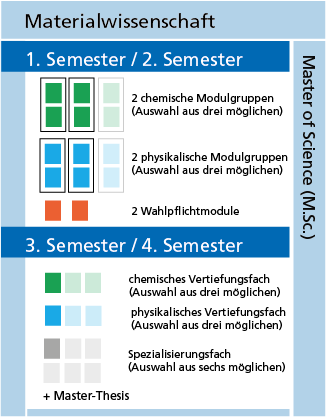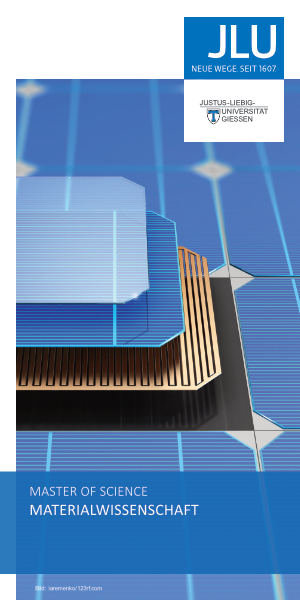Advanced Materials (M.Sc.)
Taught in German
Overview
-
Picture: Serhii Yaremenko/123rf.com
- Overview
-
 This Master's course offers the possibility to acquire a double degree. Double Degree programmes are available with Osaka University (Japan), Kansai University (Japan) and the University of Padua (Italy).
This Master's course offers the possibility to acquire a double degree. Double Degree programmes are available with Osaka University (Japan), Kansai University (Japan) and the University of Padua (Italy).Overview
The Master's course "Advanced Materials" is a consecutive study programme, which is based on a completed Bachelor's degree in Advanced Materials or a Bachelor’s degree with a broad natural sciences education with adequate knowledge in chemistry, mathematics and physics and with a clearly-shown emphasis in chemistry and physics. Further information about the admission can be found under "Application"
The degree programme is offered in cooperation with faculty 07 (physics) and faculty 08 (chemistry).
During the master's degree course, students acquire a material science expertise with the possibility to select a clear focus area in the material science research.
Beside the essential study contents, students acquire advanced laboratory-related technical skills, as well as the ability to constitute and present contents independently and in a context-related manner.
In the Bachelor's degree course, students already aquired the ability to resolve problems by means of innovative ideas which will be enhanced in the Master’s degree course through independent processing of smaller research projects especially within the Master’s thesis.
Subject-specific prerequisites
Beside a knowledge of natural science, students applying should have a good knowledge of English.
- Duration of studies 4 Semester 120 Credit Points (CP)
-
Duration of Studies
4 Semesters - 120 Credit Points (CP)
-
Accreditation
since 23 June 2005
Composition of the Study Programme
- Duration of studies 4 Semester 120 Credit Points (CP)
-
Duration of Studies
4 Semesters - 120 Credit Points (CP)
- Composition of the Study Programme
-
Composition of the Study Programme
The 4-semester course of studies consists of one year of basic studies and one year of more detailed and specialised studies. It consists of 14 modules.

1st / 2nd semester
In each of the 1st and 2nd semester five modules must be selected:
- two chemical modules,
- two physical modules and
- one elective module
chemical module
students have to choose two out of the three follwing chemical module groups:
- Functional Organic and Soft Materials (module, 1st semester) and
Organic Materials, Preparation and Properties (module, 2nd semester) - Solid State and Material Chemistry (module, 1st semester)
Modern Concepts of Inorganic Chemistry (module, 2nd semester) - Physical Chemistry 4 – Characterization of Matter (module, 1st semester) and
Physical Chemistry 5 – Interface Chemistry (module. 2nd semester)
physical module
Apart from that, 2 modules must be chosen from the 3 following physical module groups:
- Physics of Semiconductors I (module, 1st semester) and
Physics of Semiconductors II (module, 2nd semester) - Physics of Surfaces and Interfaces I (module, 1st semester)
Physics of Surfaces and Interfaces II (module. 2nd semester) - Fundamentals of Solid State Theory (module, 1st semester) and
Solid State Body Theory (module, 2nd semester)
elective module
In addition, students have to select an elective module for the 1st and for the 2nd semester.
3rd / 4th semester
In-depth- and sepcialisation modules
With this, the establishment of the topic area of the Master`s thesis begins. First a chemistry element and a physics element are continued in the in-depth module, at the same time, in the specialisation module the students broaden their knowledge of the topic area of the Master`s thesis and become acquainted with special literature, apparatus and theoretical techniques. Practical exercises are characteristic of this section. The reports from the specialisation module serve as a preparation for the project for the Master`s thesis and will be attached to it. In this way a connection is made with the level of a natural science study programme which has placed German graduates ahead of international job applicants in this field.
In the specialisation and thesis module the students work together in a team with the Bachelor students and doctoral students of a working group. With this they learn to work with machines, equipment and software programmes and learn and deepen other preparation and characterization techniques of their particular field. The relevant specific literature is introduced in the work groups in English and in the seminar the working programmes for the various qualification levels are presented and discussed. At the same time the Master students also introduce the Bachelor students to working academically and so qualify themselves in the field of teaching (learning by teaching).Master's thesis
The final Master's thesis in the fourth semester leads to the second degree qualifying for a profession: Master of Science. In the Master's thesis students must show that they are able to work academically and independently on a limited concrete topic for a limited period and present their findings to the academic world. The Master`s thesis is to be presented in the working group, discussed by the colleagues and defended and evaluated by two examiners.
-
Further Information
A description of the core- and specialisation modules can be found in the special regulations with module descriptions and module plans (in German)
More on this... ("Spezielle Ordnung")
Courses offered in the course catalogue
- Electronical course catalogue (in German)
Application
- Commencement of Studies in the Winter Semester
-
Commencement of studies
Only possible in the winter semester
- Application: Entrance requirements
-
Entrance requirements
The requirement for acceptance into the Master's course is a completed Bachelor's degree in Advanced Materials.
The board of examiners can accept other courses of study as equivalent after individual examination. The admission may hold conditions of additional academic performances (comprising up to 18cp) which have to be presented within the first 2 semesters. These additional academic performances are not part of the Master's course.The previous coures of study must show a broad natural sciences education with adequate knowledge in chemistry, mathematics and physics and with a clearly-shown emphasis in chemistry and physics.
- Application not limited only winter
-
-
Application / Enrolment
-
The study programme is not subject to admission restrictions.
-
The enrolment period for the winter semester begins at the beginning of June.
-
The end of the enrolment period is determined anew each year, please enquire in the application portal during the enrolment period.
Different rules apply in some cases for international applicants. More...
-
-
Career Options
International
- International: incomings
-
Information about studying at Justus Liebig University Giessen (incomings)
Departmental contact persons:
International Office
General counseling of international students
Dr. Saltanat Rakhimzhanova, Patrycja Zakrzewska
Goethestr. 58, Room 38
35390 Giessen
Contact and office hours
- International pages
-
Please have a look at our International Pages for more information in English.
Further Information
- Further Information: Documents
-
PDF documents for the courses of study
- Study guide (in German)
Examination- and study regulations
- Special regulations (in German)
(with module descriptions and module plans) (in English)
(Please note that only the German version of the modules is offical and legally binding. The english Version is for informative purposes only.) - General study regulations for modular and multi-stage study programmes
Courses offered in the course catalogue
- Electronical course catalogue (in German)
- Study guide (in German)
- Working Group Material Science of JLU
- Insights into the research of the LaMa
- Master's Degree Programmes of Faculty 07
- Master's Degree Programmes of Faculty 08
- International pages
-
Please have a look at our International Pages for more information in English.
- Any Questions
-

Any Questions?
Information- and advisory services of JLU can be found under the category “contact” on this page!
Contact
-
Subject Advisors
- Subject Advisors
-
-
Faculty 07
Dr. Jörg Schörmann
I. Physikalisches Institut
Heinrich-Buff-Ring 16
35392 GiessenPhone: +49 (0) 641 - 99 33122
Joerg.Schoermann@exp1.physik.uni-giessen.deFaculty 08
Prof. Dr. Bernd Smarsly
Physikalisch-Chemisches Institut
Heinrich-Buff-Ring 17
35392 GiessenPhone: +49 (0) 641 - 99 34590
Bernd.Smarsly
-
-
Links
-
Central Study Advisor
- Beate Pitzler
- Central Student Services
-
- Students office →
(for formal matters like matriculation) - Central student advisory office
(advice for students & prospective students) - Hotline Call Justus
(first contact for all matters pertaining to studies) - International office →
(for international students)
- Students office →

